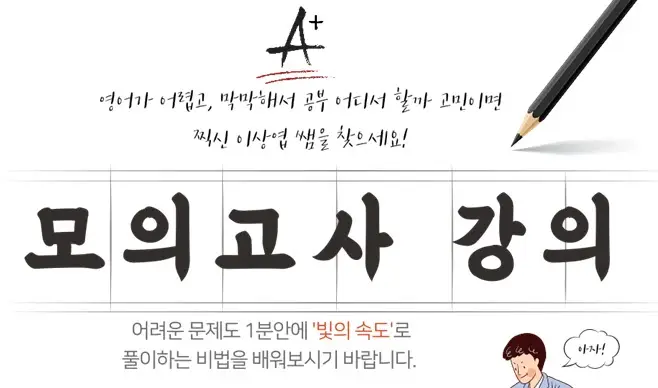2025년 3월 고2 모의고사 영어 변형문제 (9)
대한민국 1% 영어강사, 찍신 이상엽 쌤은 내신과 수능에 최적화된 실전문제를 제공합니다. 찍신쌤은 대구외고, 대구여고, 경신고, 대륜고, 정화여고, 경북고, 사대부고, 남산고, 청구고 등 대구지역 수험생들을 위해 내신 맞춤 문제를 제공하고 있습니다. 수업문의: 010-2818-6994
2025년 3월 고2 모의고사 변형문제 34번 (1)
[빈칸추론 → 제목]
다음 글의 제목으로 가장 적절한 것은?
Despite the difference between the past and the future, between what has happened and what is to come, it can be suggested, that our sense of the past has always been influenced by our view of the future. Revolutionaries have always looked to the past to frame their future cause, as is amply illustrated by examples from nationalism to communism. The future has often been seen as variously a recovery of a lost time, as a replication of what is established, or as a model bequeathed by a heroic age long gone. The writing of history is based on understanding or explaining future outcomes that were not known to contemporaries, since the historian has the benefit of hindsight and the past is nothing more than the accumulation of futures that are now our past. So, rather than see the hand of the past always shaping the future, perhaps it can be seen in reverse, with the past — in the sense of our understanding of it — being shaped by our orientation to the future.
* replication: 복제 ** * bequeath: 후세에 전하다
*** hindsight: (지난 일에 대한) 통찰력
① The Past as a Mirror of Revolutionary Ideals
② The Accumulation of Futures: A Historical Perspective
③ How Revolutionaries Frame the Future Through the Past
④ Hindsight and Foresight: History’s Intertwined Narratives
⑤ The Future Shapes the Past: A Reversal of Influence
2025년 3월 고2 모의고사 변형문제 34번 (2)
[빈칸추론 → 요약문]
다음 글의 내용을 한 문장으로 요약하고자 한다. 빈칸 (A), (B)에 들어갈 말로 가장 적절한 것은?
Despite the difference between the past and the future, between what has happened and what is to come, it can be suggested, that our sense of the past has always been influenced by our view of the future. Revolutionaries have always looked to the past to frame their future cause, as is amply illustrated by examples from nationalism to communism. The future has often been seen as variously a recovery of a lost time, as a replication of what is established, or as a model bequeathed by a heroic age long gone. The writing of history is based on understanding or explaining future outcomes that were not known to contemporaries, since the historian has the benefit of hindsight and the past is nothing more than the accumulation of futures that are now our past. So, rather than see the hand of the past always shaping the future, perhaps it can be seen in reverse, with the past — in the sense of our understanding of it — being shaped by our orientation to the future.
* replication: 복제 ** * bequeath: 후세에 전하다
*** hindsight: (지난 일에 대한) 통찰력
The relationship between the (A) and the future suggests that our understanding of history is shaped not only by hindsight but also by our orientation toward what is (B) . |
(A) (B)
① past …… ahead
② past …… uncertain
③ history …… uncertain
④ present …… ahead
⑤ present …… behind
[서술형 대비]
How does hindsight influence the writing of history?
(후견지식[사후 통찰력]은 역사 서술에 어떤 영향을 미치는가?)
Hindsight influences the writing of history by allowing historians to interpret and explain past events with knowledge of their eventual outcomes, which were unknown to contemporaries at the time. This perspective enables historians to view the past as an accumulation of futures that have already unfolded, shaping their understanding of historical events in light of how they contributed to or influenced later developments.
(후견지식은 역사가들이 당시 동시대 사람들에게 알려지지 않았던 궁극적 결과에 대한 지식으로 과거 사건을 해석하고 설명할 수 있게 함으로써 역사 서술에 영향을 미친다. 이러한 관점을 통해 역사가들은 과거를 이미 전개된 미래의 축적으로 보고, 역사적 사건에 대한 이해를 형성하여 이후의 발전에 기여하거나 영향을 미친 방식에 비추어 볼 수 있다.)
2025년 3월 고2 모의고사 변형문제 35번
[무관한 문장 → 문장 삽입]
글의 흐름으로 보아, 주어진 문장이 들어가기에 가장 적절한 곳을 고르시오.
In other words, a dictionary functions in many cases as a cross-reference or translator between words one knows and words that one doesn’t yet know. |
Dictionaries are relatively good resources for anyone interested in finding out what a word means. Using one set of words to define another word is called a lexical definition. ( ① ) But it’s important to understand the limits of dictionary definitions. ( ② ) More often than not, a definition in a dictionary requires readers to have a fairly robust understanding of the language already at their disposal. ( ③ ) Even the most obscure words in a dictionary, say, for example, “pulchritudinous” or “kalokagathia,” must be defined using words that the reader already knows and understands. ( ④ ) Otherwise, the dictionary isn’t very helpful. ( ⑤ ) Another potential problem with dictionaries is that they often simply report on the way a word is commonly used, which can nevertheless be conceptually problematic and can change significantly over time.
* lexical: 어휘적인 ** robust: 탄탄한 *** obscure: 난해한
※ 정답 및 해설은 유료입니다. 교사용, 학생용 워드파일 구입문의는 채널 톡 또는 전화(010-2818-6994)

